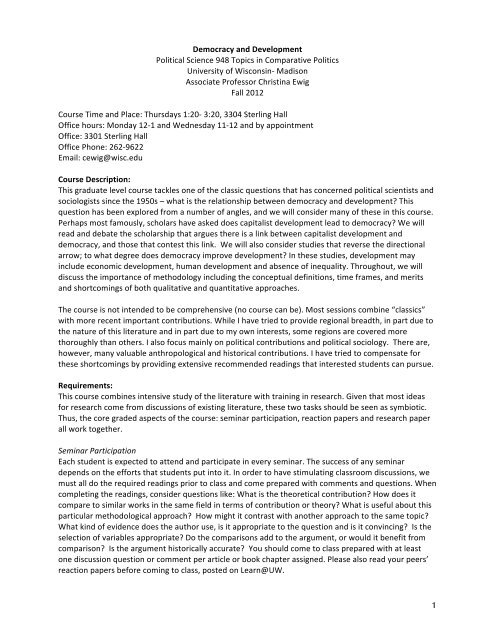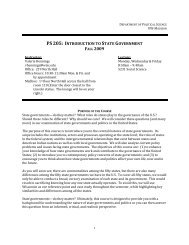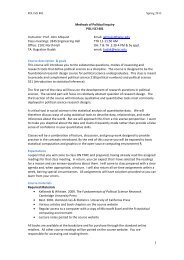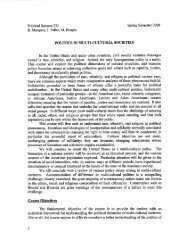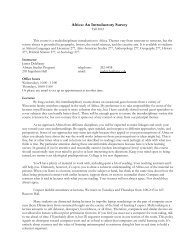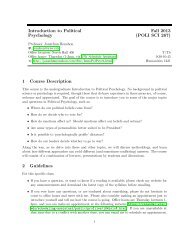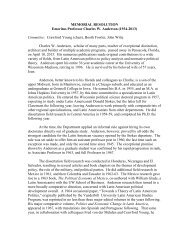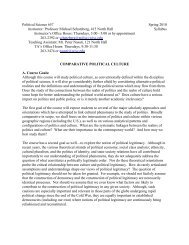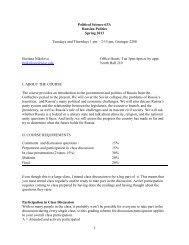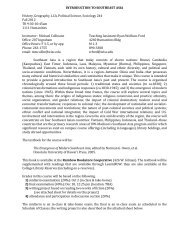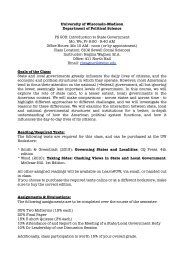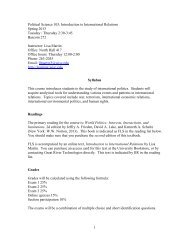PS 948 Dem Development Syllabus.pdf - Department of Political ...
PS 948 Dem Development Syllabus.pdf - Department of Political ...
PS 948 Dem Development Syllabus.pdf - Department of Political ...
Create successful ePaper yourself
Turn your PDF publications into a flip-book with our unique Google optimized e-Paper software.
<strong>Dem</strong>ocracy and <strong>Development</strong> <strong>Political</strong> Science <strong>948</strong> Topics in Comparative Politics University <strong>of</strong> Wisconsin-‐ Madison Associate Pr<strong>of</strong>essor Christina Ewig Fall 2012 Course Time and Place: Thursdays 1:20-‐ 3:20, 3304 Sterling Hall Office hours: Monday 12-‐1 and Wednesday 11-‐12 and by appointment Office: 3301 Sterling Hall Office Phone: 262-‐9622 Email: cewig@wisc.edu Course Description: This graduate level course tackles one <strong>of</strong> the classic questions that has concerned political scientists and sociologists since the 1950s – what is the relationship between democracy and development? This question has been explored from a number <strong>of</strong> angles, and we will consider many <strong>of</strong> these in this course. Perhaps most famously, scholars have asked does capitalist development lead to democracy? We will read and debate the scholarship that argues there is a link between capitalist development and democracy, and those that contest this link. We will also consider studies that reverse the directional arrow; to what degree does democracy improve development? In these studies, development may include economic development, human development and absence <strong>of</strong> inequality. Throughout, we will discuss the importance <strong>of</strong> methodology including the conceptual definitions, time frames, and merits and shortcomings <strong>of</strong> both qualitative and quantitative approaches. The course is not intended to be comprehensive (no course can be). Most sessions combine “classics” with more recent important contributions. While I have tried to provide regional breadth, in part due to the nature <strong>of</strong> this literature and in part due to my own interests, some regions are covered more thoroughly than others. I also focus mainly on political contributions and political sociology. There are, however, many valuable anthropological and historical contributions. I have tried to compensate for these shortcomings by providing extensive recommended readings that interested students can pursue. Requirements: This course combines intensive study <strong>of</strong> the literature with training in research. Given that most ideas for research come from discussions <strong>of</strong> existing literature, these two tasks should be seen as symbiotic. Thus, the core graded aspects <strong>of</strong> the course: seminar participation, reaction papers and research paper all work together. Seminar Participation Each student is expected to attend and participate in every seminar. The success <strong>of</strong> any seminar depends on the efforts that students put into it. In order to have stimulating classroom discussions, we must all do the required readings prior to class and come prepared with comments and questions. When completing the readings, consider questions like: What is the theoretical contribution? How does it compare to similar works in the same field in terms <strong>of</strong> contribution or theory? What is useful about this particular methodological approach? How might it contrast with another approach to the same topic? What kind <strong>of</strong> evidence does the author use, is it appropriate to the question and is it convincing? Is the selection <strong>of</strong> variables appropriate? Do the comparisons add to the argument, or would it benefit from comparison? Is the argument historically accurate? You should come to class prepared with at least one discussion question or comment per article or book chapter assigned. Please also read your peers’ reaction papers before coming to class, posted on Learn@UW. 1
• Gerring, John et al. 2005. “<strong>Dem</strong>ocracy and Economic Growth: A Historical Perspective.” World Politics 57(3): 323–364. http://www.jstor.org.ezproxy.library.wisc.edu/stable/<strong>pdf</strong>plus/40060105.<strong>pdf</strong>?acceptTC=true • Krieckhaus, Jonathan. 2006. “<strong>Dem</strong>ocracy and Economic Growth: How Regional Context Influences Regime Effects.” British Journal <strong>of</strong> <strong>Political</strong> Science 36(2): 317. http://www.jstor.org.ezproxy.library.wisc.edu/stable/<strong>pdf</strong>plus/4092232.<strong>pdf</strong>?acceptTC=true Recommended: • Huntington, Samuel P. 1968 (2006). <strong>Political</strong> order in changing societies. New ed. New Haven, Conn. ; London: Yale University Press. • Henry, Clement Moore and Robert Springborg. 2010. Globalization and the Politics <strong>of</strong> <strong>Development</strong> in the Middle East. Cambridge: Cambridge University Press. • See Footnote 1 <strong>of</strong> Gerring for a good overview <strong>of</strong> this literature. November 8: The Role <strong>of</strong> Colonialism • Mahoney, James. 2010. Colonialism and Postcolonial <strong>Development</strong>: Spanish America in Comparative Perspective. Cambridge: Cambridge University Press. Recommended: • Ake, Claude. 1996. <strong>Dem</strong>ocracy and <strong>Development</strong> in Africa. Washington DC: Brookings Institution Press. • Mamdani, Mahmood. 1996. Citizen and subject: contemporary Africa and the legacy <strong>of</strong> late colonialism. Princeton, N.J: Princeton University Press. • Young, Crawford. 1997. The African Colonial State in Comparative Perspective. New Haven: Yale University Press. • Kohli, Atul. 2004. State Directed <strong>Development</strong>: <strong>Political</strong> Power and Industrialization in the Global Periphery. Cambridge: Cambridge University Press. • Acemoglu, D., S. Johnson, and J. A. Robinson. 2002. “Reversal <strong>of</strong> fortune: Geography and institutions in the making <strong>of</strong> the modern world income distribution.” Quarterly Journal <strong>of</strong> Economics 117(4): 1231–1294. • Acemoglu, Daron, Simon Johnson, and James A Robinson. 2001. “The Colonial Origins <strong>of</strong> Comparative <strong>Development</strong>: An Empirical Investigation.” American Economic Review 91(5): 1369–1401. • Sokol<strong>of</strong>f, Kenneth L., and Stanley L. Engerman. 2000. “History Lessons: Institutions, Factors Endowments, and Paths <strong>of</strong> <strong>Development</strong> in the New World.” The Journal <strong>of</strong> Economic Perspectives 14(3): 217–232. • Banerjee, Abhijit, and Lakshmi Iyer. 2005. “History, Institutions, and Economic Performance: The Legacy <strong>of</strong> Colonial Land Tenure Systems in India.” The American Economic Review 95(4): 1190–1213. • Lankina, Tomila, and Lullit Getachew. 2012. “Mission or Empire, Word or Sword? The Human Capital Legacy in Postcolonial <strong>Dem</strong>ocratic <strong>Development</strong>.” American Journal <strong>of</strong> <strong>Political</strong> Science 56(2): 465–483. November 15: Does <strong>Dem</strong>ocracy Reduce Economic Inequality? *Paper Proposals Due* • Lenski, Gerhard Emmanuel. 1966. Power and privilege; a theory <strong>of</strong> social stratification. New York: McGraw-‐Hill, Ch. 12 (on Learn@UW) • Bollen, Kenneth A., and Robert W. Jackman. 1985. “<strong>Political</strong> <strong>Dem</strong>ocracy and the Size Distribution <strong>of</strong> Income.” American Sociological Review 50(4): 438–457.http://www.jstor.org.ezproxy.library.wisc.edu/stable/<strong>pdf</strong>plus/2095432.<strong>pdf</strong>?acceptTC=true • Boix 2003 Ch. 5 • Timmons, Jeffrey F. 2010. “Does <strong>Dem</strong>ocracy Reduce Economic Inequality?” British Journal <strong>of</strong> <strong>Political</strong> Science 40(04): 741–757. http://journals.cambridge.org.ezproxy.library.wisc.edu/action/displayFulltext?pageCode=100101&type=1&fid=7908219&jid=J<strong>PS</strong>&volumeId=40&issueId=04&aid=7908217 8


